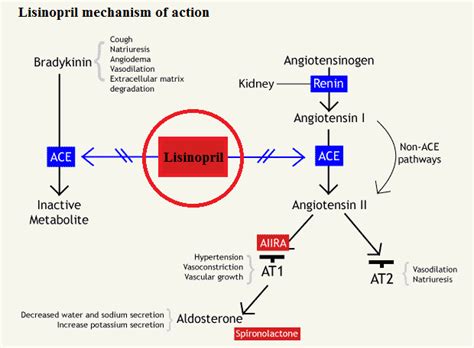Intro
Learn about Lisinopril 5mg, a blood pressure medication, and its uses, side effects, and dosage. Understand ACE inhibitors, hypertension treatment, and heart health management with this comprehensive guide.
Lisinopril is a medication that has been widely used for decades to treat various health conditions, including high blood pressure and heart failure. As a medication, it is essential to understand its uses, benefits, and potential side effects to ensure safe and effective treatment. In this article, we will delve into the world of lisinopril, exploring its mechanisms, benefits, and potential drawbacks, as well as providing a comprehensive guide for those taking lisinopril 5mg.
Lisinopril belongs to a class of medications known as angiotensin-converting enzyme (ACE) inhibitors. These medications work by blocking the action of a natural chemical in the body that constricts blood vessels, allowing blood to flow more smoothly and reducing blood pressure. By lowering blood pressure, lisinopril helps to reduce the risk of heart attack, stroke, and kidney damage. Additionally, lisinopril has been shown to be effective in treating heart failure, a condition in which the heart is unable to pump enough blood to meet the body's needs.
The importance of managing high blood pressure and heart failure cannot be overstated. According to the American Heart Association, high blood pressure affects over 100 million adults in the United States, while heart failure affects over 6 million adults. If left untreated, these conditions can lead to serious complications, including kidney damage, vision loss, and even death. Fortunately, medications like lisinopril have been shown to be effective in managing these conditions, improving quality of life and reducing the risk of complications.
Lisinopril 5mg: What You Need to Know

Lisinopril 5mg is a commonly prescribed dose for the treatment of high blood pressure and heart failure. As with any medication, it is essential to follow the prescribed dosage and treatment plan to ensure safe and effective treatment. Lisinopril 5mg is typically taken once daily, with or without food. It is essential to take the medication at the same time each day to maintain a consistent level of the medication in the body.
Benefits of Lisinopril 5mg
The benefits of lisinopril 5mg are numerous. By lowering blood pressure and reducing the risk of heart attack and stroke, lisinopril 5mg can help to improve overall health and well-being. Additionally, lisinopril 5mg has been shown to be effective in reducing the risk of kidney damage and vision loss, common complications of high blood pressure and heart failure.Some of the key benefits of lisinopril 5mg include:
- Lowering blood pressure and reducing the risk of heart attack and stroke
- Reducing the risk of kidney damage and vision loss
- Improving overall health and well-being
- Effective in treating heart failure and reducing the risk of hospitalization
- Can be taken once daily, making it a convenient treatment option
How Lisinopril 5mg Works

Lisinopril 5mg works by blocking the action of a natural chemical in the body that constricts blood vessels. This chemical, known as angiotensin II, causes blood vessels to narrow and constrict, increasing blood pressure. By blocking the action of angiotensin II, lisinopril 5mg allows blood vessels to relax and widen, reducing blood pressure and improving blood flow.
The mechanism of action of lisinopril 5mg can be broken down into several key steps:
- Lisinopril 5mg is absorbed into the bloodstream after oral administration
- The medication blocks the action of angiotensin II, a natural chemical that constricts blood vessels
- Blood vessels relax and widen, reducing blood pressure and improving blood flow
- The medication reduces the risk of heart attack and stroke by lowering blood pressure and improving blood flow
Potential Side Effects of Lisinopril 5mg
While lisinopril 5mg is generally well-tolerated, there are potential side effects to be aware of. Some common side effects of lisinopril 5mg include: * Coughing * Dizziness * Headache * Fatigue * Nausea and vomitingLess common but more serious side effects of lisinopril 5mg include:
- Allergic reactions, such as hives and itching
- Increased risk of infection
- Kidney damage
- Liver damage
It is essential to report any side effects to your healthcare provider, as they can help to determine the best course of treatment.
Lisinopril 5mg Interactions

Lisinopril 5mg can interact with other medications, including:
- Diuretics, which can increase the risk of low blood pressure
- Potassium supplements, which can increase the risk of high potassium levels
- Nonsteroidal anti-inflammatory drugs (NSAIDs), which can reduce the effectiveness of lisinopril 5mg
It is essential to inform your healthcare provider of all medications you are taking, including over-the-counter medications and supplements, to minimize the risk of interactions.
Lisinopril 5mg and Pregnancy
Lisinopril 5mg is not recommended for use during pregnancy, as it can increase the risk of birth defects and other complications. Women who are pregnant or planning to become pregnant should inform their healthcare provider, as they may need to switch to a different medication.Lisinopril 5mg Dosage and Administration

Lisinopril 5mg is typically taken once daily, with or without food. The medication should be taken at the same time each day to maintain a consistent level of the medication in the body.
Some key tips for taking lisinopril 5mg include:
- Take the medication at the same time each day
- Take the medication with or without food
- Do not stop taking the medication without consulting your healthcare provider
- Inform your healthcare provider of any changes in your medical condition or medications
Lisinopril 5mg and Kidney Function
Lisinopril 5mg can affect kidney function, particularly in individuals with pre-existing kidney disease. Regular monitoring of kidney function is essential to minimize the risk of complications.Some key things to know about lisinopril 5mg and kidney function include:
- Lisinopril 5mg can increase the risk of kidney damage in individuals with pre-existing kidney disease
- Regular monitoring of kidney function is essential to minimize the risk of complications
- Individuals with kidney disease should inform their healthcare provider, as they may need to adjust their dosage or switch to a different medication
Lisinopril 5mg and Liver Function

Lisinopril 5mg can also affect liver function, particularly in individuals with pre-existing liver disease. Regular monitoring of liver function is essential to minimize the risk of complications.
Some key things to know about lisinopril 5mg and liver function include:
- Lisinopril 5mg can increase the risk of liver damage in individuals with pre-existing liver disease
- Regular monitoring of liver function is essential to minimize the risk of complications
- Individuals with liver disease should inform their healthcare provider, as they may need to adjust their dosage or switch to a different medication
Lisinopril 5mg and Other Medical Conditions
Lisinopril 5mg can interact with other medical conditions, including: * Diabetes * Gout * Kidney disease * Liver disease * Heart failureIndividuals with these conditions should inform their healthcare provider, as they may need to adjust their dosage or switch to a different medication.
Conclusion and Final Thoughts

In conclusion, lisinopril 5mg is a commonly prescribed medication for the treatment of high blood pressure and heart failure. While it is generally well-tolerated, there are potential side effects and interactions to be aware of. By understanding the benefits, mechanisms, and potential drawbacks of lisinopril 5mg, individuals can make informed decisions about their treatment and minimize the risk of complications.
We encourage readers to share their experiences with lisinopril 5mg, ask questions, and engage in discussions about this medication. By working together, we can promote greater awareness and understanding of lisinopril 5mg and its role in managing high blood pressure and heart failure.
What is lisinopril 5mg used for?
+Lisinopril 5mg is used to treat high blood pressure and heart failure.
How does lisinopril 5mg work?
+Lisinopril 5mg works by blocking the action of a natural chemical in the body that constricts blood vessels, allowing blood to flow more smoothly and reducing blood pressure.
What are the potential side effects of lisinopril 5mg?
+Common side effects of lisinopril 5mg include coughing, dizziness, headache, fatigue, and nausea and vomiting. Less common but more serious side effects include allergic reactions, increased risk of infection, kidney damage, and liver damage.
